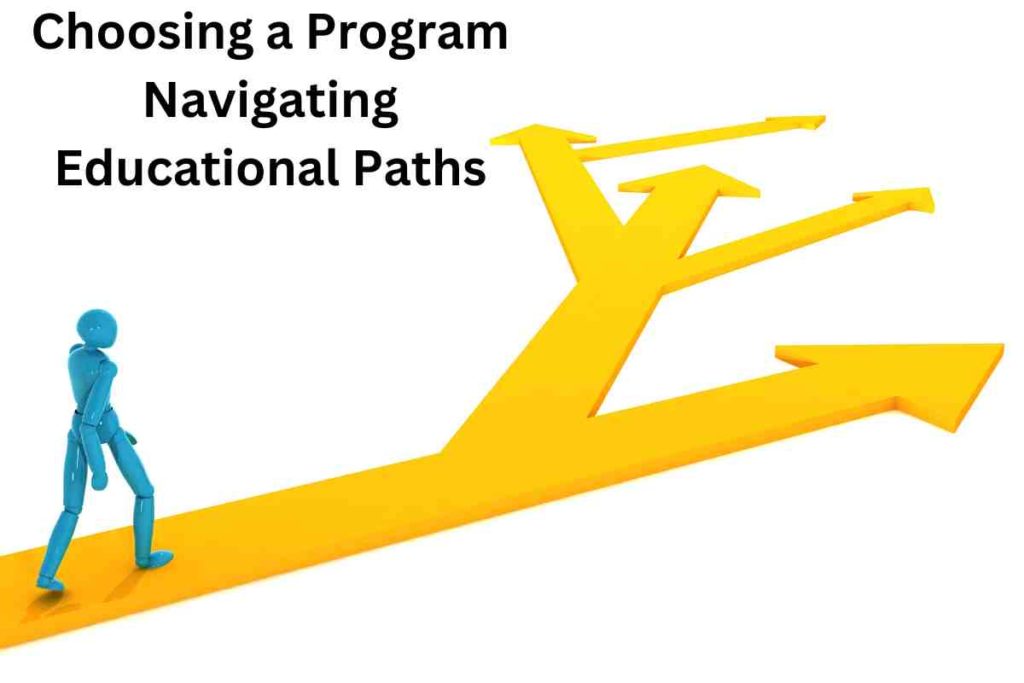Choosing a Program Navigating Educational Paths

Choosing a Program Navigating Educational Paths: Canada, with its esteemed educational institutions and welcoming environment, has become a coveted destination for students worldwide. Let’s delve deep into choosing a program and navigating the educational paths, emphasizing the Canadian Study Visa.
Understanding Canada’s Educational Landscape
Canada boasts diverse universities and colleges, each offering unique programs and opportunities. To select the right program, it’s essential to research the course content, the faculty, and potential career opportunities post-graduation.
Top Universities to Consider
- University of Toronto: Known for its research-intensive programs.
- McGill University: Renowned for its medical school.
- University of British Columbia: Popular for its arts and humanities courses.
The Importance of Course Alignment
Once you’ve shortlisted institutions, align your course choice with your career aspirations. This ensures not only academic fulfilment but also better job prospects in the future.
Critical Factors in Course Selection
- Course Duration: How long will you be committed?
- Internship Opportunities: Practical experience can be invaluable.
- Course Relevance: Ensures alignment with future job roles.
Navigating the Application Process
The application process can be daunting. It’s crucial to understand the prerequisites for each program, from academic qualifications to extracurricular achievements.
Crafting a Compelling Application
- Statement of Purpose (SOP): This is your chance to showcase your passion and suitability for the program.
- Letter of Recommendations: Trusted faculties or professionals vouching for your capabilities.
- Academic Transcripts: A testament to your intellectual prowess.
Decoding the Canada Study Visa
Obtaining a Canada Study Visa is a vital step in your educational journey. It’s not just a stamp in your passport but a gateway to countless opportunities in the country.
Eligibility Criteria for the Study Visa
- Proof of acceptance from a Designated Learning Institution (DLI).
- Evidence of sufficient funds to cover tuition fees, living expenses, and return transportation.
- No criminal record (a police certificate might be requested).
- A health examination, if required.
Preparing for the Visa Interview
The interview is an opportunity to demonstrate your genuine intent to study in Canada. Highlight your academic achievements, the rationale behind choosing Canada, and your post-study plans.
Post-Study Opportunities
Canada offers numerous avenues for students post-graduation. The Post-Graduation Work Permit (PGWP) allows students to work in Canada after completing their studies, potentially leading to permanent residency.
Leveraging Alumni Networks
Engage with alums from your chosen institution. Their insights can offer a real-world perspective on job opportunities and help you build a robust professional network in Canada.
Integrating into Canadian Academic Culture
Adjusting to a new academic environment, especially diverse as Canada’s, can be both exhilarating and challenging. Being well-prepared for this transition ensures a more fulfilling educational experience.
Embracing Diversity and Inclusion
Canada is a mosaic of cultures; its academic institutions mirror this diversity. Students get the unparalleled advantage of interacting with peers from various cultural, ethnic, and socio-economic backgrounds.
- Group Activities: Participate actively in group assignments or projects. It’s a chance to understand varied perspectives and foster collaborative skills.
- Cultural Events: Many universities host cultural weeks or festivals. Engaging in these events aids in cultural assimilation and broadens horizons.
Financial Management for International Students
Managing finances is critical to student life, especially for those from different economic backgrounds.
Budgeting Essentials
- Tuition and Books: Always allocate a fixed budget for academic essentials.
- Living Expenses: Research the cost of living in your chosen city. This includes rent, utilities, transportation, and food.
- Miscellaneous Expenses: Always have a small fund for unforeseen expenses or leisure activities.
Seeking Financial Aid
Many Canadian institutions offer international students scholarships, grants, or work-study opportunities. It’s worthwhile to research these options well in advance.
Leveraging Campus Resources
Universities and colleges in Canada are well-equipped with resources tailored to international students’ needs.
Academic Support
- Writing Centers: These assist in academic writing, ensuring your assignments meet the institution’s standards.
- Tutoring: Many institutions offer peer tutoring for challenging subjects.
Mental and Physical Well-being
- Counselling Services: Moving to a new country can be overwhelming. Counselling services provide emotional support during tough times.
- Recreation Centers: Engage in physical activities, join fitness classes, or use the gym facilities to ensure a balanced lifestyle.
Building Lasting Connections
Fostering relationships within and outside the academic community can significantly enhance your Canadian experience.
Networking Events and Workshops
Regularly attending events related to your field of study can pave the way for internships or job opportunities post-graduation.
Joining Student Organizations
Student clubs or organizations are a great way to pursue hobbies, develop leadership skills, and meet like-minded individuals.
Delving into the Canadian Work Experience
For many international students, the allure of Canada isn’t limited to its top-tier educational institutions. The prospect of gaining work experience in this dynamic country is equally enticing. Immersing oneself in the Canadian workforce can lead to transformative personal and professional growth.
Navigating the Canadian Job Market
Understanding the intricacies of the Canadian job market is pivotal for international students aiming to gain relevant work experience during or after their studies.
- Research Industries: Before diving into job applications, it’s vital to research industries prevalent in the region where you’re studying. For instance, Alberta is known for its oil and gas sector, while Toronto is a hub for finance and tech.
- Localize Your Resume: Canadian employers have specific expectations from resumes. Ensure yours is concise, highlights relevant experience, and follows the Canadian format.
Co-op Programs and Internships
Many Canadian educational institutions offer co-op programs, seamlessly integrating academic learning with practical work experience.
- Duration: Co-op placements can range from a few months to a year, offering substantial industry exposure.
- Diverse Opportunities: Students can choose from many sectors from tech giants to non-profit organizations based on their interests and course relevance.
Building a Professional Network
In Canada, as in many places, sometimes it’s not just what you know but who you know. Building a robust professional network can be invaluable.
Attend Networking Events
- Industry Conferences: Engage with professionals, stay updated with industry trends, and discover potential job opportunities.
- University Alumni Meets: These events are a goldmine for networking. Your desired industry alumni can provide insights, guidance, and potential referrals.
Online Platforms
- LinkedIn: Regularly update your profile, engage with content relevant to your industry, and connect with professionals and recruiters in your field.
Understanding Work Rights and Regulations
As an international student, you must know your work rights and any restrictions tied to your study visa.
- Work Hours: As per Canadian regulations, international students can work up to 20 hours per week during academic sessions and full-time during breaks.
- Post-Graduation Work Permit (PGWP): After completing your studies, you may be eligible for a PGWP, allowing you to work in Canada for up to three years, depending on your program’s duration.
Also, Read Part-time Jobs in Canada: Balancing Studies with Work
Advancing to Permanent Residency and Citizenship
The allure of Canada extends beyond its academic and professional opportunities. Many international students, captivated by the country’s quality of life, multiculturalism, and progressive values, seek to make Canada their permanent home. The transition from a student to a permanent resident and, eventually, a citizen is a journey filled with promise.
Pathways to Permanent Residency
Canada offers multiple pathways for international students to transition to permanent residency.
- Canadian Experience Class (CEC): Tailored for those with Canadian work experience, this is a popular option for students who’ve worked post-graduation.
- Provincial Nominee Program (PNP): Provinces in Canada have specific immigration programs targeting skilled individuals. Being nominated by a province can significantly expedite the residency process.
Critical Considerations for Permanent Residency
- Eligibility Criteria: This includes factors like age, educational qualifications, work experience, and language proficiency.
- Express Entry Profile: A comprehensive profile that ranks candidates based on various factors, helping the Canadian government identify potential residents.
Advantages of Permanent Residency
- Work Rights: As a permanent resident, you have the liberty to work for any employer and aren’t bound by the restrictions of a work permit.
- Access to Services: Enjoy the most social benefits Canadian citizens receive, including health care.
- Family Inclusion: Your immediate family can live, study, and work in Canada.
Transitioning to Citizenship
After relishing permanent residency privileges, the next monumental step is obtaining Canadian citizenship.
- Residency Obligation: Before applying for citizenship, ensure you’ve lived in Canada for at least 1,095 days in the five years before applying.
- Citizenship Test: Applicants aged 18-54 at the time of application must take a test on Canadian history, values, symbols, and geography.
Celebrating Canadian Citizenship
Once you’ve successfully obtained citizenship, you become an integral part of the Canadian fabric.
- Rights: The privileges are extensive, from voting in elections to holding a Canadian passport.
- Civic Duties: Being a citizen also comes with responsibilities, such as serving on a jury when called upon.
Beyond Citizenship: Thriving in the Canadian Mosaic
Once you’ve established roots in Canada as a citizen, the journey of truly thriving in this multicultural tapestry begins. It’s not just about fulfilling legal requirements or obtaining paperwork but truly understanding, participating in, and contributing to Canadian society.
Engaging with Local Communities
The real essence of Canada lies in its local communities, each offering unique experiences and insights.
- Community Events: There’s always something happening, from local fairs to cultural festivals. These events foster community spirit and offer a platform to understand Canadian traditions deeply.
- Volunteer Work: This provides an avenue to give back to the community, make connections, and learn about local initiatives and causes.
Continuing Education and Skill Development
Pursuing knowledge never ends, and Canada offers myriad opportunities for lifelong learners.
- Workshops and Seminars: Canadian institutions frequently host these, allowing individuals to stay updated with industry trends and developments.
- Online Courses: With the digital revolution, many Canadian universities offer online courses, making continuous learning flexible and accessible.
Embracing Canadian Nature and Adventures
Canada’s vast landscapes, ranging from the Rockies to its serene lakes, beckon with adventure and beauty.
- National Parks: Explore Banff, Jasper, and the Pacific Rim National Park Reserve. Each park offers unique activities, from hiking and skiing to wildlife viewing.
- City Adventures: Beyond natural beauty, cities like Toronto, Vancouver, and Montreal are bustling with activities, cultural events, and global cuisines.
Arts, Culture, and Heritage
Canada’s rich tapestry of cultures offers a feast for art and culture enthusiasts.
- Museums: Institutions like the Royal Ontario Museum or the Museum of Anthropology chronicle Canada’s history and diverse cultures.
- Theatre and Performances: Be it French plays in Quebec or the world-renowned Toronto International Film Festival, there’s no shortage of cultural extravaganzas.
Building a Legacy in Canada
As individuals settle and thrive, they consider building and leaving a legacy.
- Entrepreneurial Ventures: Canada supports budding entrepreneurs with various programs, fostering innovation and creating job opportunities.
- Philanthropy: Setting up charitable foundations or contributing to causes ensures that one’s impact is felt long after.
Nurturing Roots and Fostering Growth: A Journey of Contribution
While Canada welcomes with open arms, integrating an individual into its social and cultural tapestry is a mutual journey of giving and taking. As international students evolve into citizens, there’s an innate responsibility to nourish the land that has offered countless opportunities.
Active Civic Participation
Being an active part of the democratic process strengthens the foundation of the Canadian society.
- Voting: Regularly participate in federal, provincial, and local elections. It’s not just a right but a responsibility to make informed choices for the nation’s future.
- Community Leadership: Taking on roles in local councils or community boards helps shape local policies and initiatives.
Promoting Sustainability and Environmental Consciousness
Canada’s pristine landscapes are its pride. Protecting these natural wonders is crucial.
- Eco-friendly Practices: Simple habits, like recycling or public transport, can significantly make a difference.
- Supporting Green Initiatives: Engage with organizations that promote sustainable practices, be it tree-planting drives or clean-up campaigns.
Empowering the Next Generation
Ensuring that future generations inherit a thriving Canada is imperative.
- Mentoring: Share your experiences and insights with new immigrants or students, aiding their integration journey.
- Educational Initiatives: Collaborate with schools and colleges to introduce programs highlighting multiculturalism and inclusivity.
Celebrating and Preserving Cultural Diversity
While it’s essential to assimilate, preserving one’s unique cultural identity enriches the Canadian mosaic.
- Cultural Festivals: Organize or participate in events that showcase your heritage, be it through dance, music, or cuisine.
- Language Preservation: Host language classes or set up community centres that keep native languages and dialects alive for future generations.
Embracing the Spirit of Philanthropy
Canada has a robust culture of giving, and it’s vital to continue this legacy.
- Charitable Donations: Contribute to causes close to your heart, healthcare, education, or wildlife conservation.
- Volunteerism: Time is as valuable as money. Regularly volunteer for local NGOs or community initiatives, making a tangible difference.
Conclusion
Choosing the right program and navigating the educational paths in Canada is a meticulous process. With thorough research and preparation, coupled with the advantages of the Canadian Study Visa, students are poised for academic and professional success in the heart of North America.
Frequently Asked Questions on “Navigating Educational Paths: Canada Study Visa”
1. What is a Canada Study Visa?
A Canada Study Visa permits international students to study at designated learning institutions (DLI) in Canada for more than six months.
2. How can I apply for a Canada Study Visa?
To apply, you must first receive a letter of acceptance from a DLI, prove you have sufficient funds, and undergo a medical exam if required.
3. How long does the visa process take?
The processing time varies depending on the country of application but typically ranges from 3 to 16 weeks.
4. Is IELTS mandatory for a Canada Study Visa?
While not always mandatory, proving English language proficiency through tests like IELTS can strengthen your application.
5. Can I work while studying in Canada?
With a valid study permit, you can work up to 20 hours per week during regular academic sessions and full-time during breaks.
6. Do I need to renew my Study Visa?
If your course duration exceeds the validity of your visa, you’ll need to renew it.
7. What’s the difference between a Study Visa and a Study Permit?
The Study Visa is an official document stamped in your passport, while the Study Permit is a written document allowing you to study in Canada.
8. Can my family accompany me?
Your spouse can apply for an open work permit, and your minor children can study at Canadian primary or secondary schools.
9. Can I transfer between programs or institutions?
Yes, but you may need to update or change your Study Permit depending on the type and length of the program.
10. How do I prove financial sufficiency?
You can provide bank statements, proof of a Canadian account in your name, tuition payment receipts, or a letter from a person or institution providing you with money.
11. What if my application is rejected?
You can appeal the decision or reapply with additional supporting documentation.
12. Are online courses eligible for a Study Visa?
Only if they are part of a more extensive program you attend in person in Canada.
13. How early should I apply before my course starts?
Due to processing times, it’s advisable to apply at least six months before your course begins.
14. What happens after I complete my studies?
You can apply for a Post-Graduation Work Permit (PGWP) to work in Canada.
15. Can I travel outside Canada and return during my studies?
Yes, you can travel and return with a valid Study Visa and passport.
16. Are there any scholarships available for international students?
Yes, numerous institutions and external organizations offer scholarships for international students.
17. What if I decide to quit my studies?
If you quit your studies, you must inform IRCC and may have to leave Canada.
18. How does health insurance work for international students?
Health insurance is mandatory, and its provisions vary by province. Some provinces provide it for free, while others require private insurance.
19. Is there an age limit for a Study Visa?
There’s no age limit, but the applicant must genuinely intend to study.
20. Can I change my institution or program?
Yes, but you must notify IRCC, and it must still be a DLI.
21. Do I need a police certificate?
Applicants from certain countries may need a police certificate to prove they don’t have a criminal record.
22. Can I extend my Study Visa from within Canada?
Yes, you can apply for an extension within Canada.
23. What’s the duration of a Post-Graduation Work Permit?
The PGWP duration depends on your program’s length but can be up to three years.
24. Do I need a job offer to apply for a PGWP?
No, a job offer isn’t required to apply for a PGWP.
25. Is there a pathway to permanent residency after studying?
Many international students opt for programs like Canadian Experience Class or Provincial Nominee Programs for permanent residency.







